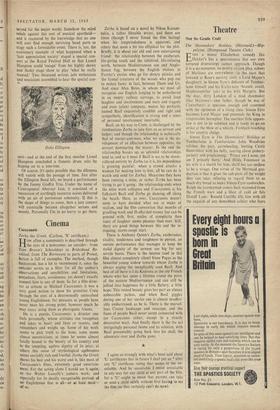Cinema
Cacoyannis
Zorba the Greek. (Canton, 'X' certificate.) How often a community is described through the eyes of a newcomer, an outsider: from Tom Brown's .Schooldays to Brideshead Re- visited, from The Borrowers to parts of Proust, fiction is full of examples. The method, though hackneyed, has a lot to recommend it, since the outsider serves as a filter for all the author's observations and sensibilities and limitations, Prejudices, fears, avoidances, yet doesn't exactly commit him to any of them. So for a film direc- tor as urbane as Michael Cacoyannis it was a very good notion to show his primitive Crete through the eyes of a determinedly uninvolved Young Englishman, for peasants as people have never been his strong point, however much he may enjoy using them as photogenic friezes.
He is a puzzle, Cacoyannis; a director one feels personally, whose attitudes one recognises and takes to heart and likes or resents, and remembers and weighs up. Some of his work seems to pick truth to the bone, some seems almost meretricious; at times he seems almost fatally bound to the beauty of his country and to the tempting, ageless dignity of its poor, at others this sense of mythological agelessness seems enviably rich and fruitful. Zorba the Greek shows his best and his worst and is, like most of Cacoyannis's films, extremely good entertain- ment. For the acting alone I would see it again, or for Walter Lassally's camera work; and especially for its deadly recognisable portrait of an Englishman that is all—or at least most— of us. Zorba is based on a novel by Nikos Kazant- zakis, a rather filmable writer, and there are
times (though I never found the film boring) when his longwindedness is apparent, and others that seem a bit too elliptical for the plot.
Briefly, it is about our old and ever entertaining friend: the relationship between the exuberant, life-giving south and the inhibited, life-refusing north, between Mediterranean sun and Anglo- Saxon fog, between the English visitors in Forster's stories who go for dreary picnics and the faunal creatures of the woods who pop out to makes faces; in fact, between Them and Us. And since Alan Bates, in whom we must all recognise our English longing to be unbothered in an empty railway carriage, to avoid loud laughter and involvement and tears and tragedy and even (alien) company, makes his perfectly named Basil exquisitely credible and right and sympathetic,, identification is strong and a sense of personal involvement inevitable.
Basil, on his way to Crete, is challenged by the rumbustious Zorba to take him on as servant and helper; and though the relationship is technically that of master-and-man, what we see is the de- velopment of an affection between opposites. the servant dominating the master. In the end the relationship breaks up, as splendid relationships tend to, and as it must if Basil is not to be steam- rollered entirely by Zorba (as it is, his dependence is growing painful: when a crowd attacks a woman for making love to him, all he can do is watch and send for Zorba). Meantime they have been running a mine, or rather Zorba has been trying to get it going: the relationship ends when the mine work collapses and (Cacoyannis at his folksiest) Basil and Zorba gb dancing off along the beach. Here, as ever, Cacoyannis doesn't seem to have decided what use to make of realism, and the film convention that months of gruelling work and ill-afforded money lost can be greeted with, first, smiles of complicity then roars of laughter seems phonier than ever. Still, there are good things between this and the in- triguing, storm-swept start.
There is Anthony Quinn's Zorba, exuberance, vitality, tenderness and toughness in person, an outsize performance that manages to keep the stolid dignity of the servant too big for any servile boots. There is the intense (and in thii film almost completely silent) Irene Papas as the beautiful young widow towards whom Zorba is always urging the inexplicably cool Basil. And best of all there is Lila Kedrova as the old French whore who has spent a lifetime round the ports of the eastern Mediterranean and can still be jollied into happiness by a little flattery, a little hope. This ruined beauty gives her part an almost unbearable pathos, and when Basil giggles during one of her stories one is almost insuffer- ably embarrassed, as he is. There is the marvel- lous Cretan landscape and seascape, and the faces of people Basil never seems connected with (or Cacoyannis either, except in a strictly decorative way). And finally there is the (to us) intriguingly personal theme and its solution, with Basil presumably going back into his shell, the adventure over and Zorba gone.
I agree so strongly with what's been said about 'll• certificates that in future I shall put an * after any 'IJ' certificate rating that seems to me un- suitable. And by unsuitable I mean unsuitable in any way for any child at any part of the film, for a 'LP ought to mean that parents can take or send a child safely without first having to see the film (as they certainly can't do now).


































 Previous page
Previous page